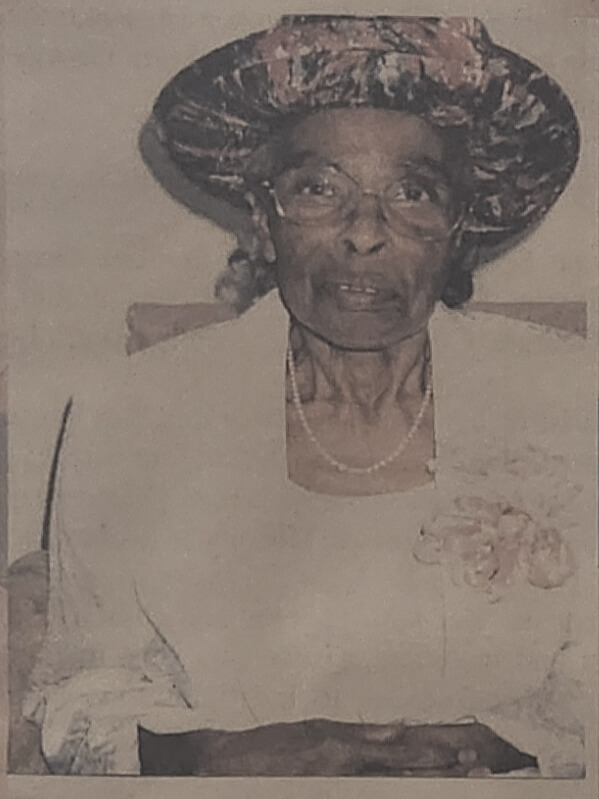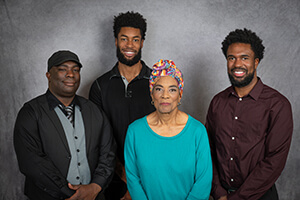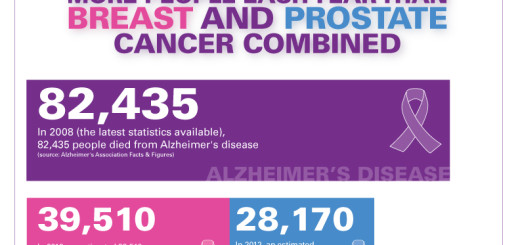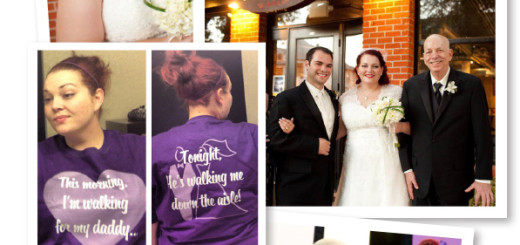Breaking stereotypes: Black man cares for mother and grandmother
During his early 20s, Cole spent two years caring for his grandmother who had dementia. It wasn’t until over a decade later, while caring for his mother, who now has dementia, that he learned about the Alzheimer’s Association® and the services they offer. While attending both support groups and education programs, Cole found himself to not only be one of the few men in attendance but also the only Black man. Cole shares why he looks forward to attending the support group, and hopes more Black men will join him.
Someone to talk to
Patricia was an avid reader who would prefer to pick up a book rather than watch the movie. She was very social, always had a smile, was knowledgeable and to this day has an opinion about everything. She was interested in anime and considered herself a Trekie (someone who likes the show Star Trek) with a crush on Sir Patrick Stewart (the main character of the show).
As a young adult, she met a coworker who would only go on vacation every five years and even then, only be gone for one week. Patricia knew that wasn’t the life she wanted to live. “Ma thought there was more to life than vacation once every five years for a week,” said Cole, her oldest son. “She wanted to see Japan, so she joined the Navy.”
During her time in the U.S. Navy, she met Cole’s father, a fellow serviceman. Patricia got pregnant with Cole and decided to have the baby, which for her, meant leaving the Navy. Because of this, Patricia never made it to Japan.
Patricia and Cole’s father never married but they kept in touch. Patricia did go on to marry, eventually having two more boys and later moving the family to Cleveland. Unfortunately, Cole and his stepdad didn’t get along. Cole moved to Atlanta to be with his father. Despite the distance, Cole knew he could still call his mother any time he needed help.
“Even those years in Atlanta, [Mom and I would] email or talk on the phone if I needed advice,” said Cole. “That was the type of person Mom was, she was someone I could talk to. She always helped me keep a straight moral compass. She taught me to stand up for myself as well as my brothers. She was someone you could talk to.”
Connecting with services
Patricia’s family and friends began to notice she was having some problems with her memory. Looking back, Cole believes he could see signs as early as 2017. In 2023, a friend offered to take her to the doctor where Patricia was initially diagnosed with mild cognitive impairment (MCI).
According to the Alzheimer’s Association 2024 Alzheimer’s Disease Facts and Figures report half of caregivers say they received help with dementia health care, support and services for the care recipient from someone within their physician’s office or hospital. Additionally, nurses (42%) and social workers (35%) most often provide navigation help to dementia caregivers.
Cole was lucky to receive help from a social worker at his mother’s medical facility. The social worker told Cole about the Alzheimer’s Association. Cole said, “I got some really great information [about the disease] as well as literature about what it is my mother was going through and how to best deal with it.”
Caring for his grandmother
While learning about the Association and the services they provided was new information to Cole, dealing with dementia was not. In the early 2000s Cole spent several years caring for his grandmother who had dementia.
After leaving the Air Force, Cole needed a place to live while he took classes at a nearby college. Cole’s maternal grandmother suggested he move in with her. When his grandmother first started showing symptoms, her family came by frequently to help. “When family care started to fall off from other people, I was, by default, on the caregiver roster,” said Cole. “I’d be up with her all night, [if I left the room for too long] then she’d start screaming for help. I’d have to go in and sooth her. I was dealing with her verbal abuse and then also having to go to class the next day.”
The doctor had told Patricia that her actions were due to sundowning. Sundowning is increased confusion that people living with Alzheimer’s and dementia may experience from dusk through night. Also called “sundowner’s syndrome,” it is not a disease but a set of symptoms or behaviors that may include difficulty sleeping, anxiety, agitation, hallucinations, pacing and disorientation.
“With Grandma, there was no one else there. I learned from my short stint in the military, if there’s something to be done you just do it. I gave her a sponge bath and changed her diaper. Reciprocity, she used to do this very same thing for me as an infant.
“I always had a knack for mechanics, how things works and that’s what I’d try to do while handling Grandma. She can assist me to better to change her diaper. She preferred me doing those things than our female relatives, she would say that I did it ‘better than these women,’ did.”
Eventually, Cole’s grandmother was moved to a care setting in San Leandro where she died in 2011.
Finding support
After connecting with the Alzheimer’s Association, Cole learned about the caregiver support groups that the Association offers. He was torn between two groups: Caregivers under 40, or a group for the Black community. He ultimately chose the group for the Black community (African American – Black Dementia Family Caregiver Support Group (Lunch and Learn)) which is hosted on Zoom.
Alzheimer’s support groups are peer-or professionally led groups for caregivers, individuals living with Alzheimer’s and others dealing with the disease. All support groups are facilitated by trained individuals. Many locations offer specialized groups for children, individuals with younger-onset and early-stage Alzheimer’s, adult caregivers and others with specific needs.
“I don’t know how many places feel like safe spaces for you, [but] what I really enjoy about the support group is that this is one for me,” said Cole. “The hour and a half to two hours that I’m there, people are going through a lot when it comes to caring for your loved one.
“I have a bad habit of trying to shoulder everything. People have their lives and their own families, and this one family member they’re trying to care for. The stories that are shared. I like coming in and learning new tips and exchanging and giving tips on how to do something.
“This is my second time being in this situation. If I had had this knowledge [that I have] now, [like] how to wash a person. Having that knowledge would have better suited me over a decade ago. I just really like the group. Ms. Gray is a great leader, she always has information she can point us in the right direction to.
“In the beginning I resisted but I made myself go. [The support group has] proven to be really beneficial. It’s a great place to be on the first Friday of the month, it’s something I look forward to.”
The only Black man
In addition to the support group, Cole has also attended other education classes hosted by the Association. However, one thing he’s noticed at every event he has attended is that there is a lack of men attending, especially Black men. As of the writing of this blog, Cole is the only man in his support group.
“I noticed in the Savvy Caregivers course I’ve been taking for six weeks. There are other men there, but they’re usually White men. [They’re the] spouses of the person they’re giving care for. Even in that [class], its mostly women, and I’m still the minority in that one.”
The Facts and Figures report states that among Black Americans ages 70 and older, 21.3% are living with Alzheimer’s. Additionally, older Black Americans are twice as likely as older Whites to have Alzheimer’s or another dementia.
Cole thinks the lack of Black men attending education and support groups has to do with culture. “My personal view on it is that when it comes to caring for extended family members there’s someone else that can do that,” said Cole. “It’s supposed to be a man’s responsibility or duty to go out and provide the means for which the care is given.
“If Ma had a daughter, I wouldn’t expect her to just drop what she’s doing to go and provide care. I believe that it’s almost more socially acceptable for a woman to give up her life to go care for someone else. That’s why [my siblings and I are] looking for [professional] help.”
A willingness to help
Currently, Cole’s mother is still living in her home, while her sons live on the property so they’re close by if she needs help. Cole has taken over he finances and keeps an eye on emails and texts to help his mother avoid being scammed. He also finds dementia friendly activities he can do with her which includes taking her to a nearby senior center.
Cole encourages other caregivers to stay positive and have a willingness to help. “Stay positive, listen, and try to help as best you can. That is one golden piece of advice I feel that can help not just Black men but people in general. Patience, a good sense of humor and a willingness to help.”
Cole’s support group, African American – Black Dementia Family Caregiver Support Group (Lunch and Learn) meets the 1st and 3rd Friday of the month from 11:30 a.m.-Noon. For more information or to register please call the Alzheimer’s Association 24/7 Helpline at 800.272.3900.
For more information on resources for the Black American community please visit alz.org/blackamericans




















